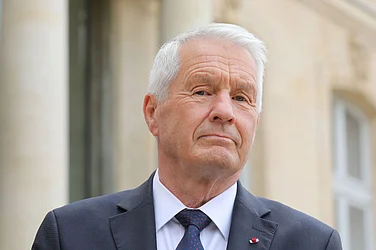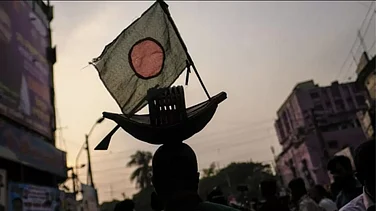In the latest such attack in Afghanistan, a suicide bombing in Kabul on Friday killed at least 19 students and wounded 27 others.
A sucide bomber struck a coaching centre in the Shia-populated Dashti Barchi area of Afghan capital Kabul. The area is populated by minority Shia Muslim community.
Around 300 students had gathered at the centre to take a practice university entrance exam on Friday morning when the suicide bomber detonated himself. The victims included high school graduates, both girls and boys, according to Taliban Spokesman Khalid Zadran. The centre is known as the Kaaj Higher Educational Centre and helps students prepare and study for college entrance exams.
Visuals from shortly before the blast show a large number of students in the hall, the site of the blast.
Zadran said centres in the area will need to ask the Taliban for additional security when they host events with big gatherings, such as the study prep on Friday.
The Friday's bombing comes days after a blast near a mosque in Kabul killed seven and wounded 41. Last Friday, a parked car laden with bomb near Kabul's Wazir Akbar Khan mosque detonated when worshippers were coming out of the mosque.
While no one claimed responsibility for Friday's attack, it is suspected that ISIS could be behind the attack as it has in the past carried out similar attacks against the minority Shia and Hazaras. Most of the ethnic Hazaras in Afghanistan are Shia Muslims. The ISIS and Taliban are also engaged in a power tussle in Afghanistan as it does not subscribe to the Taliban's vision for the country.
"Our teams have dispatched at the site of the blast to find out more details," said Abdul Nafi Takor, a Taliban-appointed spokesman for the Interior Ministry, said earlier.
The death toll likely to rise
Though the official death toll as per Taliban authorities is 19, multiple reports say the actual number is higher and authorities are suppresing numbers.
Independet journalist Bilal Sarwary reported a member of the coaching centre being attacked as saying that he counted at least 100 corpses after the bombing.
"We have so far counted 100 dead bodies of our students. The number of students killed is much higher. Classroom was packed. This was a mock university entrance exam, so students could prepare for the real one," Bilal quoted teh member as saying.
Bilal furthe reported that the Taliban authorities have also barred hospitals from updating the media about the casualties admitted or deaths confirmed.
"We have been warned by the Taliban security officials not to speak or provide information to the media about security incidents. We have also been warned not to allow media to film inside hospital," Bilal quoted one of the owners of a private hospital in West Kabul as saying.
Faran Jeffery of think tank Islamic Theology of Counter Terrorism also said the death toll is expected to rise.
"According to Taliban-controlled police, at least 19 people killed and dozens wounded in the attack, which was a suicide bombing, at the Kabul education centre. The death toll is expected to rise," said Jeffrey on Twitter.
Condemnation from United States
The US charge d'affaires for Afghanistan Karen Decker condemned the attack in a tweet.
"Targeting a room full of students taking exams is shameful; all students should be able to pursue an education in peace and without fear. We hope for a swift recovery for the victims and we grieve with the families of the deceased," said Decker.
Afghanistan's Hazaras, who are mostly Shia Muslims, have been the target of a brutal campaign of violence for the past several years, blamed on the regional affiliate of the ISIS. Militants have carried out several deadly attacks in Dashti Barchi, including a horrific 2020 attack on a maternity hospital that killed 24 people, including newborn babies and mothers.
The long list of deadly attacks in Afghanistan
The Friday's attack is the latest in recent weeks which shows that the Taliban have failed to ensure security even in the capital Kabul. Despite their promises of bringing peace after years of war, the Taliban regime has been unable to ensure security and prevent blasts.
Dozens of people have been killed in blasts in recent weeks.
In July, two civilians were killed in a blast in Kabul International Cricket Stadium during a league match. It was said to be a hand grenade attack. Thirteen people were also wounded in the attack.
In August, a bomb blast in a mosque in Kabul killed 21 people and injured 33, according to BBC. The mosque's emir was also killed in the blast.
On September 2, an explosion in a mosque in Herat killed 18 people, including a leading pro-Taliban cleric. At least 21 people were injured. The blast in Herat also targeted Friday prayers — just like last Friday's and this Friday's attack.
On September 5, an explosion outside the Embassy of Russia in Kabul killed two embassy staffers. The attack was a major embarrasment for the Taliban regime as it showed to the world that it's not able to provide security even within the high profile diplomatic enclave.
Taliban's failure to ensure security in Afghanistan
The continued attacks in Afghanistan highlight two things — Taliban's failure to ensure security and the rising challenge from ISIS.
While formal claims of responsibilities are rare, the bombings are usually believed to be carried out by the terrorist group ISIS through its regional affiliate ISKP.
Moreover, the attacks in Kabul, and particular the bombing at the Russian embassy, highlighted the weak hold of Taliban even in the capital.
Faran Jeffery, Deputy Director of think tank Islamic Theology of Counter Terrorism, said on Twitter that the Russian embassy bombing sent two messages.
"One, Taliban cannot even secure Kabul on their own, let alone rest of the country. Two, any foreign country daydreaming about having its own little separate paradise in Afghanistan should think twice," said Jeffrey.
Russia is among the few countries to have kept its embassy functional in Kabul after tha Taliban takeover of the country. Though it has not recognised the Taliban regime, it is in touch with its officials.
Following Friday's bombing of the coaching centre, Jeffrey noted that all assurances and claims of security by Taliban have proved to be false.
"Just yesterday, Taliban spokesperson tweeted that Kabul is completely secure and peaceful. That tweet was widely shared, including by Pakistani imbecile supporters of the Taliban. One of these imbeciles even called Kabul the most secure city in the world. Today a school gets blown up," said Jeffrey.
Talian's tussle with ISIS
The Taliban has been engaged in a conflict with terrorist group ISIS and its affiliate ISKP from before its takeover of Afghanistan last year.
While Taliban is understood to be in league with Al-Qaeda, evident by the presence of its late chief Ayman al-Zawahiri in Kabul, it continues to be in a power tussle with the ISIS, which is opposed to the Taliban's vision of Afghanistan.
The ISIS has previously targeted mosques and worshippers, and especially members of Afghanistan's minority Shias in attacks. ISIS is a Sunni jihadist group and has frequently targeted Shias since its inception.
The Taliban is a nationalist organisation whose ambitions are limited to having an Islamic state —called Emirate— in Afghanistan. The ISIS, on the other hand, has global ambitions and aims to create a global Islamic state which it calls "Caliphate". The Taliban and ISIS are also ideologically different.
Think tank Wilson Center expplains: "ISIS-K subscribes to the Jihadi-Salafism ideology — and plays up the ‘purity’ of its anti-idolatry credentials. The Taliban, on the other hand, subscribe to an alternative Sunni Islamic sectarian school, the Hanafi madhhab, which ISIS-K regards as deficient. The two groups also differ over the role of nationalism. ISIS-K fiercely rejects it, which runs counter to the Afghan Taliban’s aims of ruling over Afghanistan."
(With AP inputs)


























